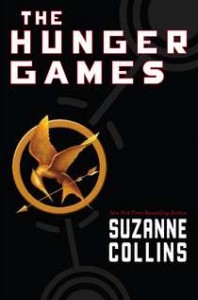[NO SPOILERS]
Usually, I try to review books… to make an comprehensive argument for their merit and worth or lack thereof. In this case, however, it seems to be a somewhat pointless exercise. Collins’ trilogy thoroughly saturates the media these days, and with over 7000 reviews on Amazon, I’m unlikely to make a case that hasn’t been made before. If you want my opinion in a nutshell: they’re great. They’re flawed in various ways, sure, but the flaws are never worse than irritants, and the book certainly isn’t guilty of the most common charge; that it is derivative of earlier works. The story is sufficiently archetypal that the telling is more important than plot affinities, and The Hunger Games is well told. It is sparely written and brutal with a realism that belies its futuristic setting. Sometimes this brutality is painful. You should read it.
What I’d like to do instead of detailed review, however, is to talk about several features of the trilogy that struck me as significant and memorable. Specifically, I want to talk about The Hunger Games as an explicitly political work, its thematic density, and the messy and problematic third book. Since this is too long to fit into one blog entry, I’ll be doing this in three posts.
—–
POLITICAL SALIENCE AND AGGRESSIVE AMBIGUITY IN THE HUNGER GAMES
There’s been a tremendous amount of hay made over whether and what is the political message of The Hunger Games. Paul Badgley articulates an argument in the New York Magazine from the perspective of Occupy Wall Street, that “it’s the one percent [killing the kids]. I think you’d have to be blind to not see that.” Fox News’ James Pinkerton shares his network’s perspective in his claim that the books are “a furious critique of our political system, in which the central government grows rich from the toil of the masses.” Other, “non-partisan” appraisals claim that there is no way of knowing what the actual political “message” is, sometimes claiming that this is the result of “weak world-building.” I absolutely disagree with the last claim… given the efficient and tightly-controlled plotting of the first two books, there is little question that political ambiguity is intentional. It would have been easy to have explained, in just a paragraph or two, for example, the role of commerce or an articulation of legitimate governmental prerogative in Panem, but the omission has the powerful effect of making the books’ political identity a contested ground.
Which is not to say that politics are irrelevant in the books. They are, in fact, thematically and narratively central to the entire story, from the highly-developed (and novel) concept of regionally-motivated tributary combat to its love-triangle-as-allegory-for-social-ethics. The Hunger Games aren’t just political; they are relentlessly political. The nature of its political explication is such that real-world analogues are open to interpretation.
Here’s an example in my own experience of the books. As a liberal (in fact, as a socialist), I do think that one can make an objective argument that The Hunger Games favors a Leftist message. The books’ most fundamental disparity (one that transcends partisan stereotypes about government influence and private enterprise) is a rupture between the powerful and the powerless, and in the real world there is overwhelming evidence that the consolidated private sector (read 1%) has disproportionate power which they use to leverage government policy in their favor at the expense of the functionally disenfranchised (read 99%). But I base this objective observation on real-world facts and relationships as applied to The Hunger Games. My position is not present in the books themselves. To not acknowledge this ambiguity is, in fact, to be somewhat blind about they way they are built and function. To acknowledge it alongside the books’ political salience is to also acknowledge that the books’ ambiguity is not only significant, but even aggressive.
Political salience and aggressive ambiguity of The Hunger Games trilogy is particularly significant in 2012, and especially so for members of my generation. I can’t fix exact boundaries, but I’m thinking of people in their 20s and 30s today, on the cusps of the Middle Class… the younger members of Generation X and the older part of Generation Y. Why? Because we have, en masse, eschewed looming political problems. Prior to the rise of the Occupy movement (and with the significant exception of the 2008 election) we have only had a tentative sense of political engagement. We’ve been paralyzed, it seems, by a diminishing standard of living, crisis in education, political dysfunction, a passive Democratic party and a predatory Republican party, soaring health-care costs, persistent unemployment, a marginal economic status, and on, and on. We’ve turned from these problems. We have, instead, bought into the nostalgia machine, fetishizing our childhood with endless visits to the Star Wars franchise, 8-bit video games, the music of the 80s and the 90s. Okay, so any generalization will fall short at times, but a politically-engaged generation will militate through every resource, including its (even commercially-driven) mass culture. The Hunger Games, stepping into the fray in the wake of the more apolitical (or passively political) Harry Potter and Twilight franchises confronts this political moment. Perhaps this is because it is supported, in part, by a younger, more politically-engaged generation. Or maybe my cohort is finally getting its priorities in order. Either way, I think this is a message we’ve needed to hear.
